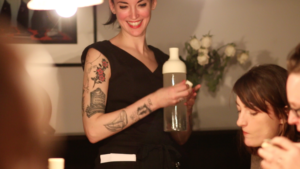About halfway through the evening at a recent event thrown by the dinner series Traffic Tide, a terrific cheer erupted from the small kitchen of the apartment that had been transformed into our restaurant for the evening, followed by relieved laughter. Suddenly feeling extremely left out, all of us guests put down our drinks and paused our dinner party conversations to shout into the kitchen about what had happened.
Our chef, Soli Zardosht, still smiling, told us that they’d just accomplished an impressive maneuver: perfectly flipping the tahchin, a Persian baked rice dish that was a sort of mascot of this dinner in honor of the Persian new year celebration Nowruz (it’s puffy rice on top, but delicious, crunchy brown rice along the part touching the bottom of the large pot where it’s prepared). Flipping the tahchin, she said, is one of those things you’ve seen your parents do a million times–flipping the omelet, making the cookies just the right size, getting the pie crust just right–but is still gratifying every single time you do it, apparently even if you’re an internationally renowned chef.

The event was hosted by one of Traffic Tide’s founders, Ksenya Samarskaya, at her place inside one of New York’s last true artist lofts, where industrial hallways lead to airy apartments with full-wall windows giving breathtaking views of the Manhattan Bridge. Everything was bespoke: Custom dinnerware by Farrah Sit and Justin Novak. Custom drinkware by Catie Newell. And of course, delicious food from Zardosht, an Iranian-born chef, who was until recently working at Caft Oto, a much-loved restaurant in Dalston, London’s Bushwick. This delicious six-course meal was Zardosht’s first professional cooking engagement in New York since recently transplanted to America.
Nowruz was a particularly apt moment for her debut, she explained. “Hopefully I’ll be showing you a bit more of the Iran I know, rather than the one you hear about in the news… A lot of the parts of it go back to Zoroastrianism. It’s got nothing to do with the current Iran, as everybody knows it, ‘Islamic Republic of.’ It’s just a celebration. You celebrate spring at the exact time of the equinox. That’s kind of a nightmare, because every year you have to check the time, and if you’re in another country, you might be doing it at 4am or 1am. You have to wake up and wear your spring clothes, and sit around the table. You just have to do it!”

This education and cross-cultural fellowship was as much the reason for the evening as getting to sample Zardosht’s tarragon, saffron, and mint meatballs, explained Samaraskaya.
“The reason I got interested in doing art and food is that they’re ways to tell deep, emotional stories. We’re in a time when being nativist or globalist is such a conversation,” she said. The series is designed to engage with issues of movement, sourcing, and immigration, she explained. These are issues close to Samaraskaya’s heart: she’s a Russian immigrant who’s suddenly finding her adopted home uncomfortably resembling her native one. The dinners should be, “a place where we can have a conversation about how we got here, and what’s going on,” she said.
We did certainly connect. Over many bottles of wine and much delicious food, we talked politics, real estate, made fun of each other’s jobs, and occasionally said something embarrassing (I heard myself say on my recordings idiotic things like, “What is going on in Detroit these days?” “You look so on-brand.”).
But it didn’t matter if we mis-spoke here and there. We were learning, and growing close, and sharing some amazing dishes.










